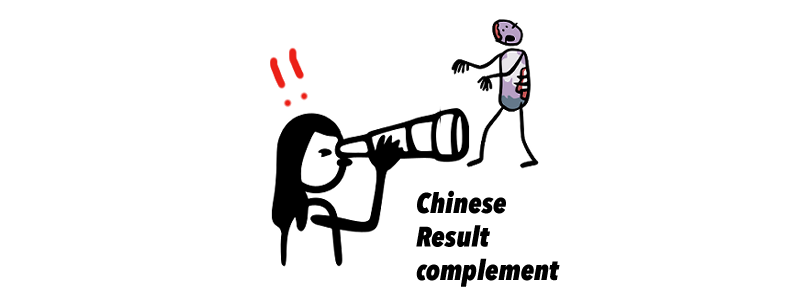Grammar Point:
The result complement is called 结果补语 jiéguǒ bǔyǔ in Chinese. It is just like its name, used to describe the result of a verb.
If you are not familiar with the result complement, I suggest you read the following article first.
- Result complement 1 (HSK 2)
RC in this article we are going to learn:
| Verb (action) | + | Result complement | = | Explanation |
|---|---|---|---|---|
| 买 mǎi (buy) | + | 到 dào (achieved its purpose) | = | 买到 mǎidào (successfully bought it) |
| 接 jiē (catch) | + | 住 zhù (firmness, steadiness, stop) | = | 接住 jiēzhù (to caught it) |
| 取 qǔ (pick, take) | + | 走 zǒu (away) | = | 取走 qǔzǒu (took away) |
| 听 tīng (listen) 看 kàn (look, watch, read) | + | 见 jiàn (only use with 听 and 看) | = | 听见 tīngjiàn (to hear) 看见 kàn jiàn (to see) |
| 打 dǎ (hit) | + | 破 pò (broken, damaged, destroyed) | = | 打破 dǎpò (to break something) |
| 关 guān (close) | + | 上 shang (attainment of an objective) | = | 关上 guānshàng (to close something) |
| 睡 shuì (sleep) | + | 着 zháo (hit the mark; succeed in) | = | 睡着 shuìzháo (fall alseep) |
Structure
S + V + RC + O
他終於買到火車票了他终于买到火车票了
He finally got the train ticket.
我吃到了我一直想吃的牛肉麵我吃到了我一直想吃的牛肉面
I had the beef noodles I’ve always wanted to eat.
我被你的樣子給迷住了我被你的样子给迷住了
I am mesmerized by the way you look. (Be attracted and stop in that moment)
我被你的樣子給嚇走了我被你的样子给吓走了
I was scared away by your look. (get scared and run away)
那本書他取走了嗎?那本书他取走了吗?
Did he take the book?
離開前記得把門關上离开前记得把门关上
Remember to close the door before you leave.
你要的包,我在義大利買著了你要的包,我在义大利买着了
The bag you want, I bought it in Italy.
他打破了鄰居的窗戶他打破了邻居的窗户
He broke the neighbor’s window.
我好像聽見老師在叫我,但是我決定當作沒聽到我好像听见老师在叫我,但是我决定当作没听到
I thought I heard the teacher calling me, but I decided to pretend I didn’t hear him.
Negation
S + 沒/不 + V + RC + O
你在哪?我沒看見你你在哪?我没看见你
Where are you? I don’t see you.
我把球傳給他,可是他沒接住我把球传给他,可是他没接住
I passed the ball to him, but he didn’t catch it.
這花瓶很貴!還好你沒摔破这花瓶很贵!还好你没摔破
This vase is very expensive! Good thing you didn’t break it!
你怎麼沒鎖上門就出去了?你怎么没锁上门就出去了?
Why did you leave the door unlocked and go out?
我沒搶走你的工作,是你自己做不好被炒了我没抢走你的工作,是你自己做不好被炒了
I didn’t take away your job. You got fired because you couldn’t do it properly yourself.
FYI
This 炒 chǎo comes from the Chinese slang 炒鱿鱼 chǎo yóuyú, which literally means ‘stir-fried squid.’ However, it’s commonly used to describe someone who has been fired or laid off from their job. The slang originated from the practice of migrant workers in Guangdong or Hong Kong who carried light luggage with them and rolled up their bamboo mats or blankets into a bundle. When they were fired, they would pack up their belongings and leave, making the bundle look like a stir-fried squid. This is a humorous and informal way to describe someone who has lost their job.
着 zháo and 到 dào
The particles 着 zháo and 到 dào can sometimes mean similar things, but they are not always interchangeable.
When used with 睡 (shuì, to sleep), only 着 zháo is correct in positive sentences.
他睡著了他睡着了 ✅
He fell asleep.
他睡到了他睡到了 ❌
In negative sentences, both can mean “cannot do something,” but the choice depends on the reason:
- Use 着 zháo for internal reasons (something inside you).
我喝太多茶,所以現在睡不著我喝太多茶,所以现在睡不着
I drank too much tea, so I can’t fall asleep. - Use 到 dào for external reasons (outside conditions).
昨天工作太多,我忙了一晚上,完全睡不到覺昨天工作太多,我忙了一晚上,完全睡不到觉
I had too much work yesterday. I was busy all night and couldn’t sleep at all.
Other Examples
那本書被買走了那本书被买走了
The book was bought (away) by someone.
那本書被買完了那本书被买完了
That book has been sold out. (bought completely)
那本書我買好了那本书我买好了
I have bought that book. (I finish my task)
那本書我買錯了那本书我买错了
I bought the wrong book.
那本書我買到了那本书我买到了
I got the book (I achieved buying it)
那本書我沒買著那本书我没买着
I didn’t successfully buy the book.


